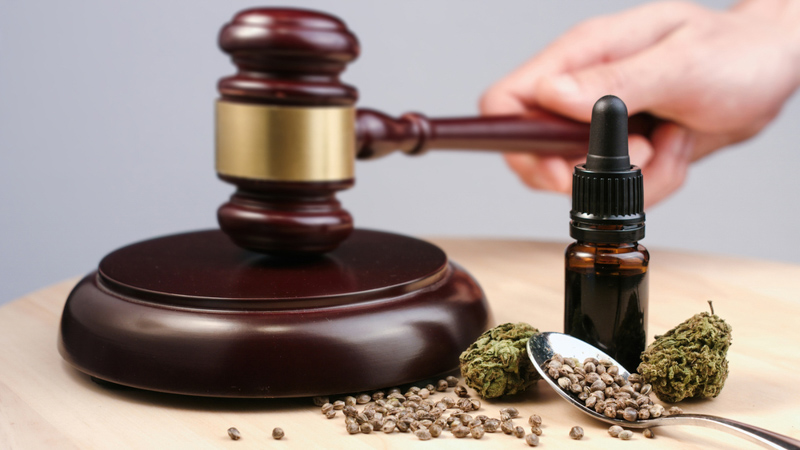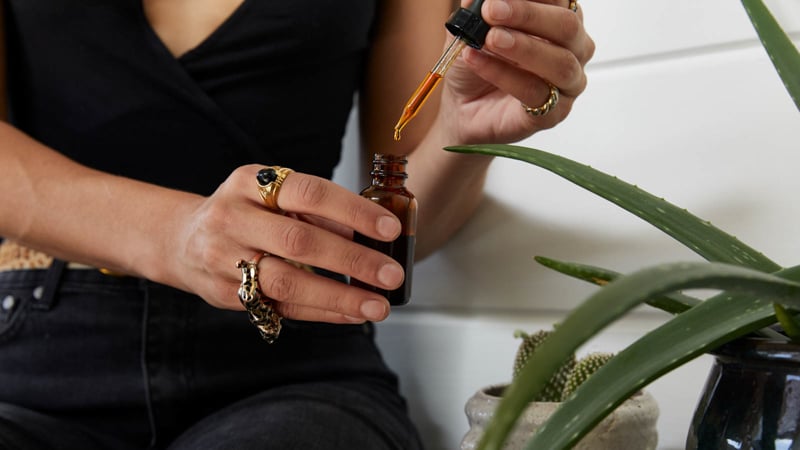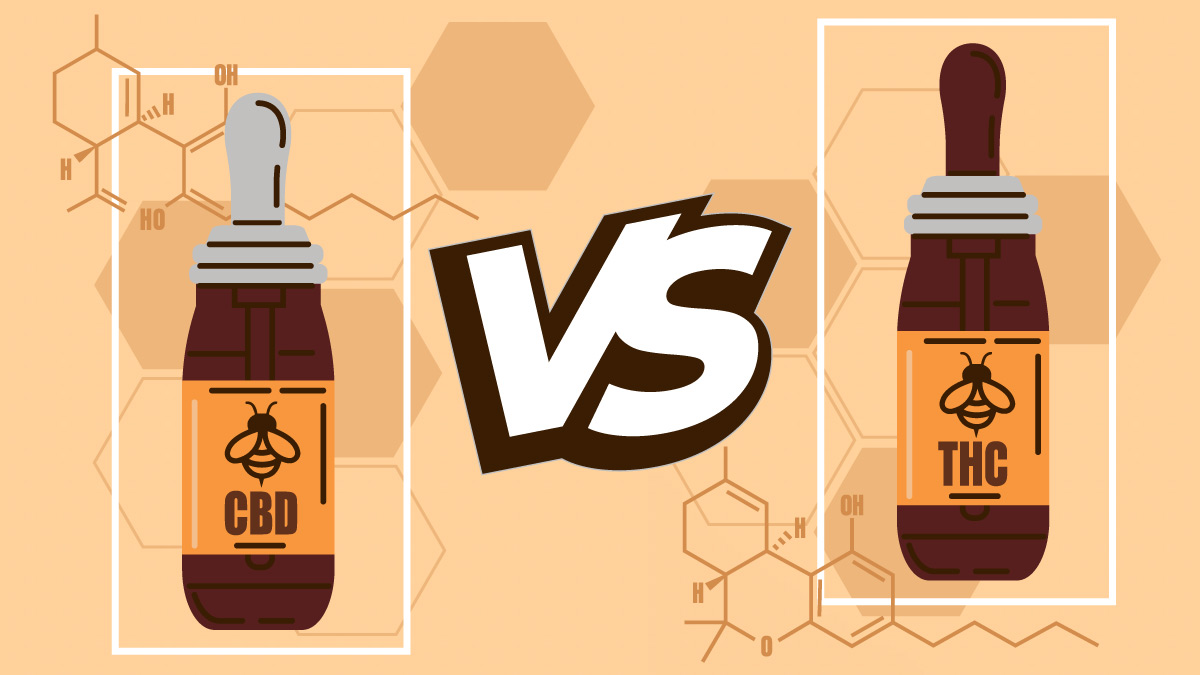Knowing the difference between CBD vs THC is essential if you want to understand the mechanism of action behind the health benefits of cannabis products and their potential therapeutic applications.
CBD and THC are the two major compounds in cannabis plants. They are responsible for their physical and psychological effects. Some varieties of cannabis come with more CBD than THC, whereas others contain reversed ratios.
The above has given rise to the whole CBD vs THC debate. People are trying to find arguments proving the superiority of one cannabinoid over the other. But in fact, the whole debate shouldn’t be about CBD vs THC. Rather than that, it should cover potential ways to get the most out of the plant’s health benefits by combining these compounds in various ratios in response to the entourage effect (more on that later in the article).
Despite some apparent similarities, CBD and THC use different mechanisms to signal the endocannabinoid system (ECS).
In this article, you’ll find everything you need to know about CBD vs THC. We’ll cover the most obvious differences between the two cannabinoids, discuss their applications, and compare them in terms of how they work together to regulate important processes in the body.
CBD vs THC: A Brief Overview of the Two Major Cannabis Compounds
CBD and THC have almost identical chemical structures. They consist of 30 hydrogen atoms, 21 carbon atoms, and 2 oxygen atoms. But the way these atoms are arranged causes them to have different effects on the body and brain.
If you’ve never used cannabis before, read the section below to learn the basic information about CBD and THC.
CBD
CBD is the abbreviation for cannabidiol, one of the two major compounds in cannabis. It’s also one of over 100 cannabinoids synthesized by scientists, and the best-researched ingredient of cannabis plants.
CBD doesn’t have intoxicating properties, meaning it won’t induce the high associated with using marijuana. Hemp-derived products contain 0.3% THC or less, which makes them legal in all 50 states under the 2018 Farm Bill signed by President Trump (1).
CBD is recognized for a wide range of health benefits attributed to cannabis. When you talk to people who take CBD, you’ll most likely hear about wellness rather than recreational uses (2).
THC
Most cannabis consumers are familiar with THC, which stands for delta-9-tetrahydrocannabinol. This compound hardly needs an introduction; even people who don’t use marijuana know what THC is.
THC produces the euphoric, analgesic, and stimulating effects that come in a package known as the “marijuana high.” While THC isn’t the only cannabinoid with intoxicating effects, it’s the only one that occurs in amounts significant enough to get the user high. This is the main reason why people have attributed THC to recreational use.
Still, THC comes with a plethora of health benefits as well. In fact, its cognitive and mind-altering properties can be used in a range of mental and physical conditions (3–4). THC may cause a few adverse effects when consumed in large doses, including dizziness, paranoia, drop in blood sugar, and fatigue.
In contrast, CBD doesn’t have such side effects. It is well tolerated by humans, even in doses as high as 1,500 mg daily (5).
Both cannabinoids can’t have fatally overdosed.
What’s the Difference Between CBD and THC? (Highlights)
Summarizing the differences between CBD vs THC, in a nutshell, is a bit challenging, but here are the most noteworthy highlights:
CBD
- CBD will make you feel calm and relaxed, but it doesn’t get you high in the way THC does. That’s because CBD is a non-intoxicant.
- CBD has more than 65 molecular targets, but it doesn’t directly interact with the CB1 cannabinoid receptors in the brain.
- CBD signals the endocannabinoid system to produce more of its natural cannabinoids (endocannabinoids). It also slows their breakdown.
- CBD can mitigate the intoxicating effects of THC.
- CBD doesn’t cause toxicity.
- CBD is safe for animals
- CBD can be obtained from hemp and marijuana
- When people describe CBD, they underline health and wellness benefits.
- Hemp-derived CBD is legal in all 50 states
THC
- THC binds to the CB1 receptors in the brain, producing the psychoactive buzz.
- When people talk about THC, they often associate it with recreational use, although THC has many health benefits as well
- THC only comes in marijuana plants
- THC is only legal in Canada, Uruguay, and 15 US states. If you have a medical marijuana card, 48 out of 50 states offer some form of a medical marijuana program.
CBD vs THC: Legality

As mentioned above, hemp-derived CBD is legal on the federal level under the provisions of the 2018 Farm Bill. The amended Agricultural Act reclassified hemp as an agricultural commodity. It was earlier categorized as a dangerous drug such as heroin and cocaine.
Today, US farmers can grow hemp for commercial use, including health supplements containing CBD. As long as your CBD oil comes with no more than 0.3%, you shouldn’t have any problems with the police.
The laws surrounding marijuana and THC are very strict in most countries around the world. Marijuana has been legalized by Canada, Uruguay, and 15 US states. The United States has a complicated history with marijuana. Since its prohibition in 1937, medical researchers have been working to debunk the myths pushed by the Reefer Madness propaganda. As the legalization movement continues to snowball through the country, we may expect changes on the federal level too.
When looking for CBD oil online, make sure that it comes from hemp unless your country or state approves adult-use of cannabis.
CBD vs THC: Psychoactivity
CBD doesn’t have a direct affinity to the cannabinoid receptors located in the brain. Therefore, it doesn’t cause a psychoactive high. Instead, CBD can modulate the endocannabinoid system and thus improve our response to stress, providing a sense of calm and balance. Some users also report improved focus after taking a low dose in the morning. On top of that, CBD counteracts the psychotropic potential of THC.
THC binds to the CB1 receptor in the brain; from there, it produces its euphoric, deeply relaxing, and mind-altering effects. Studies show that low-to-moderate doses of THC may improve cognition, promote the formation of healthy cells in the brain, and reduce stress.
CBD vs THC: Medical Benefits
THC and CBD act on the different parts of the endocannabinoid system. THC binds to CB1 and CB2 receptors, whereas CBD has little effect on both. Instead, it acts on several receptor-independent routes to signal the endocannabinoid system.
THC and CBD enhance the health benefits of each other. However, they do it through completely different mechanisms.
Studies report CBD has strong anti-inflammatory effects; it may also strengthen the immune system and help people cope with a variety of health concerns. Many physical problems involve inflammation, so consistent CBD supplementation may be helpful.
THC is a neuroprotectant, so its health benefits are mostly linked to mental health. On the physiological note, THC can also reduce pain, help with insomnia, eating disorders, and reduce the number of aggressive cells in the body.
CBD vs THC: Side Effects
CBD has an excellent safety profile. Numerous health agencies, such as the World Health Organization (WHO) have acknowledged CBD as a safe compound with no potential for abuse. That being said, CBD has a few mild side effects when consumed in large doses, including dry mouth, changes in appetite, dizziness, fatigue, and diarrhea.
There’s also a risk of potential CBD-induced drug interactions. CBD inhibits the activity of the liver enzymes that metabolize active ingredients in pharmaceutical medications. It’s important that you consult a trusted doctor before buying CBD products to avoid these interactions if you take any medications.
THC is considered safer than alcohol and caffeine, but again, it may cause a few side effects. The short-term reactions to THC include dry mouth, red, droopy eyes, sedation, and problems with coordination. Very high doses of THC are associated with elevated stress, paranoid thinking patterns, and pounding heart.
As mentioned, it’s impossible to fatally overdose on either of the cannabinoids.
CBD vs THC: Drug Testing
If your job entails regular drug testing, you’re probably concerned whether or not CBD and THC show up on a drug screening.
Drug tests don’t look for CBD and its metabolites because CBD is a non-intoxicant. There is simply no reason why a company would test its employees for the presence of this compound.
Instead, workplace drug tests look for THC and the byproducts of its metabolism. If you’re a heavy marijuana user, the THC may stay in your blood for months until the body gets rid of it completely. Occasional and lightweight users can flush the THC out of their system within a matter of days.
But since full-spectrum CBD oils contain trace amounts of THC, you might be wondering if it’s possible to test positive for THC when you take whole-plant hemp extracts.
Can you?
According to various estimates, a person would need to consume 1,900 mg of CBD daily in order to test positive for THC. However, the test would be a false-positive, so if that happens to you, report this issue to your employer and ask for another screening.
CBD vs THC? Or Maybe CBD plus THC? (The Entourage Effect)

Despite some substantial differences, CBD and THC have similar health benefits. Instead of arguing about the superiority of one cannabinoid over the other, think of them as two synergistic compounds that can enhance each other’s effects.
Similar to how CBD can reduce the psychotropic potential of THC, some of the effects of CBD are more potent in the presence of THC. Other cannabinoids, as well as terpenes, also contribute to this synergy, creating “the entourage effect.” According to cannabis experts, all compounds in cannabis are equally important, and the plan can only show its full potential when they occur next to each other (6).
Capturing the original chemical profile of hemp, along with some supportive amounts of THC allows manufacturers to increase the efficacy of their extracts without producing any mind-altering effects.
Bottom Line: Does the “CBD vs THC” Debate Make Sense?
Apparently not. Of course, it’s paramount to know the difference between CBD vs THC, but there’s no point in putting one over the other in terms of their health benefits. Both cannabinoids play important roles in the functioning of the endocannabinoid system, which is the major regulatory network in the human body.
CBD is a non-intoxicant. It has a calming and mood-elevating effect on the brain; it may also reduce some physical discomfort, promote healthy sleep, and enhance focus according to preclinical studies and case reports. However, it won’t get you high in the way THC does.
THC has a more direct fashion of interacting with the brain. It is responsible for the euphoric and mind-altering effects of marijuana. It also has a range of documented health benefits, especially when it comes to mental health.
If you’re looking for an introduction to the world of cannabis, CBD is safer due to the lack of unpleasant side effects and zero potential for abuse. However, before you buy any product, make sure to do your research and choose a company that makes CBD from organic hemp and can prove the potency and purity of its extracts with Certificates of Analysis.
References:
- U.S. Department of Agriculture (2018). “Farm Bill.” Retrieved from: https://www.usda.gov/farmbill
- Grinspoon, P. (2018). “Cannabidiol: What We Know and What We Don’t Know.” Harvard Health Medical School. Retrieved from: https://www.health.harvard.edu/blog/cannabidiol-cbd-what-we-know-and-what-we-dont-2018082414476
- Sarris, Jerome et al. “Medicinal cannabis for psychiatric disorders: a clinically-focused systematic review.” BMC psychiatry vol. 20,1 24. 16 Jan. 2020, doi:10.1186/s12888-019-2409-8
- Russo, Ethan B. “Cannabinoids in the management of difficult to treat pain.” Therapeutics and clinical risk management vol. 4,1 (2008): 245-59. doi:10.2147/tcrm.s1928
- Iffland, Kerstin, and Franjo Grotenhermen. “An Update on Safety and Side Effects of Cannabidiol: A Review of Clinical Data and Relevant Animal Studies.” Cannabis and cannabinoid research vol. 2,1 139-154. 1 Jun. 2017, doi:10.1089/can.2016.0034
- Russo, Ethan B. “Taming THC: potential cannabis synergy and phytocannabinoid-terpenoid entourage effects.” British journal of pharmacology vol. 163,7 (2011): 1344-64. doi:10.1111/j.1476-5381.2011.01238.x
